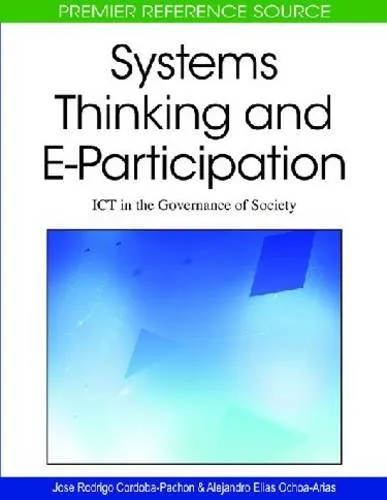Systems Thinking and E-participation: Ict in the Governance of Society (Advances in Electronic Government Research (Aegr) Book Series)
4.9
Reviews from our users

You Can Ask your questions from this book's AI after Login
Each download or ask from book AI costs 2 points. To earn more free points, please visit the Points Guide Page and complete some valuable actions.کتاب های مرتبط:
Introduction to "Systems Thinking and E-participation: ICT in the Governance of Society"
Welcome to an exploration of the intricate interplay between systems thinking, e-participation, and Information and Communication Technology (ICT) in societal governance. This book forms a critical contribution to the Advances in Electronic Government Research (Aegr) series, providing a comprehensive analysis of how technology reshapes governance and citizen engagement.
Detailed Summary of the Book
The book delves into the pivotal role that systems thinking and e-participation play in modern governance structures. Addressing the digital transformation in public service, it elucidates how ICT can streamline governmental operations, enhance transparency, and increase citizen participation. The text is structured to provide theoretical foundations while also showcasing practical applications, marrying academic insights with real-world scenarios.
A major focus is on understanding how systems thinking—an approach that views complex entities as organized wholes—can be applied to e-governance. This perspective helps in recognizing relationships within public policy and administration. The book covers a wide range of topics including digital literacy, the role of social media in civic engagement, and the impact of open data initiatives. Importantly, it also highlights challenges such as data privacy, digital divides, and ensuring equitable access.
By examining case studies and contemporary examples, the book offers readers a nuanced view of how e-participation can contribute to more inclusive and effective governance. It also seeks to foster an understanding of the dynamic and evolving nature of citizen-government interactions in the digital age.
Key Takeaways
- Understanding the integration of systems thinking in governance to improve policy-making processes.
- The critical role of ICT in transforming citizen participation and engagement with government entities.
- Identifying challenges and opportunities presented by digital governance, including ethical considerations.
- Exploring global best practices and case studies in e-participation strategies.
- Developing a framework to measure the effectiveness of e-governance initiatives.
Famous Quotes from the Book
"Systems thinking provides a lens through which the interconnectedness of societal challenges can be viewed, offering pathways for sustainable and inclusive governance solutions."
"E-participation is not just a tool for engagement but a transformative element that empowers citizens, redefining democratic processes in the digital era."
Why This Book Matters
This book is pivotal for scholars, practitioners, and policy-makers interested in the intersection of governance, technology, and society. As governments worldwide grapple with the shift toward digital administration, understanding the fundamentals of systems thinking and e-governance becomes essential. The insights offered in this book are designed to equip readers with the knowledge to implement effective digital strategies and optimize citizen engagement practices.
Furthermore, it recognizes the increasing demand for transparency and accountability in governance, providing innovative approaches to meet these expectations. By combining theory with practical examples, it serves as an essential resource for anyone looking to contribute to the advancement of electronic governance systems.
Free Direct Download
You Can Download this book after Login
Accessing books through legal platforms and public libraries not only supports the rights of authors and publishers but also contributes to the sustainability of reading culture. Before downloading, please take a moment to consider these options.
Find this book on other platforms:
WorldCat helps you find books in libraries worldwide.
See ratings, reviews, and discussions on Goodreads.
Find and buy rare or used books on AbeBooks.
1463
بازدید4.9
امتیاز0
نظر98%
رضایتReviews:
4.9
Based on 0 users review
Questions & Answers
Ask questions about this book or help others by answering
No questions yet. Be the first to ask!















